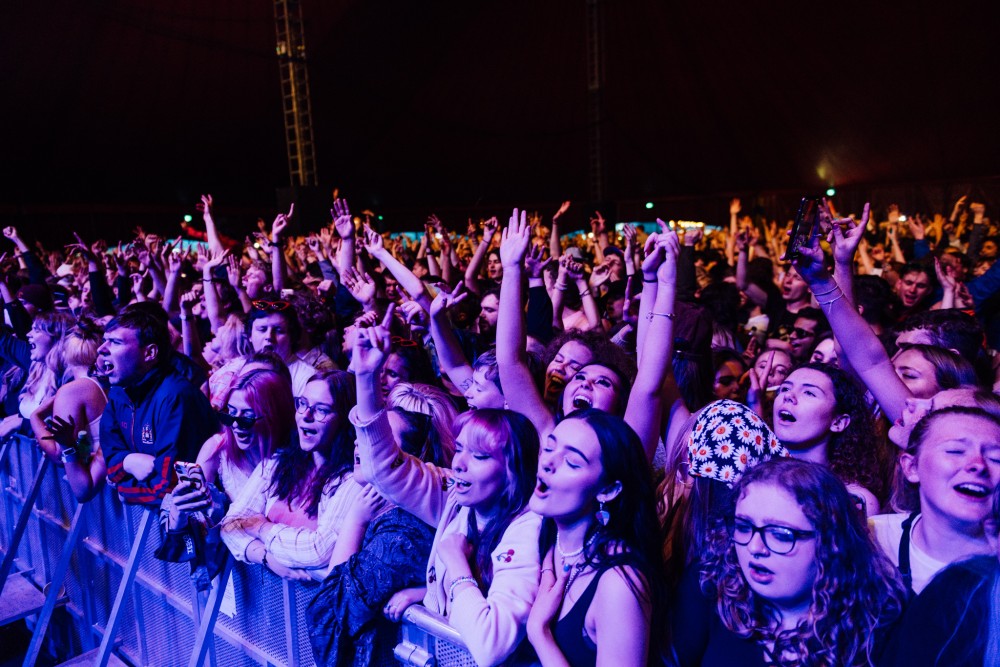Live music world speak son need for “essential” free lateral flow tests
Figures from the live music sector in the UK have spoken out on the need for lateral flow tests to remain free and available in order to keep gigs safe and happening.
Over the weekend, the Sunday Times reported that Prime Minister Boris Johnson was set to axe free lateral flow tests amidst concerns about their cost (more than £6billion of public money has been spent on mass testing using the devices), with new proposals set to outline that free tests would be limited to high-risk settings such as care homes, hospitals and schools.
However, today (Monday January 10) saw Johnson declare that free lateral flow tests would be available to the public “for as long as is necessary”. Today also saw Secretary of State for Housing, Communities and Local Government Michael Gove refuse to comment on the rapid testing situation, telling Sky News that it was “impossible to predict” for how long free lateral flow tests will be necessary, as well as that the country was “moving to a situation where it is possible to say that we can live with COVID” but that we are “not there yet”.
Appalling. They should be free for as long as Covid continues. But I guess it's one way to bring down the Covid numbers reported. If you can't afford to buy the test and have a suspected mild case or are asymptomatic, you won't be officially recorded in the stats as having it. https://t.co/rga84MbBtA
— Malorie Blackman is away. (@malorieblackman) January 9, 2022
Now, leaders of the live music sector have spoken to NME about the need to keep lateral flow tests free and available for as long as the threat of COVID remains in the year ahead.
Greg Parmley, CEO of music gig industry body LIVE, said that “easy access to free lateral flow tests are a vital tool in ensuring people can attend live music venues safely and allow people to comply with COVID certification with proof of a negative test.”
He continued: “Given the current high numbers of cases across the UK we are very pleased the government confirmed this morning they will keep LFTs free and easy to access for the coming weeks. Everyone is delighted live music is back after such a prolonged closure so any measure that can give people the confidence and access to attend events is vital for the government to continue.”
Mark Davyd, of the Music Venue Trust, also argued that it was key that the government keep testing open and available to all in order to match all of the efforts made by the grassroots gig scene to keep live music alive and safe.
“Music Venue Trust has been pursuing a programme to Reopen Every Venue Safely since April 2020,” he told NME. “That programme is built on key elements of risk mitigation that build together to create spaces that are as safe as they can be. A core element of that is a testing programme that is freely available to everyone.
“Our #TakeATest campaign has been hugely successful in allowing the live music community to play its part in the Reopen Every Venue Safely programme. We therefore urge, in the strongest possible terms, the government to keep free tests available and open to everyone.”

David Martin is CEO of the Featured Artists’ Coalition and said that removing access to free LFTs could undo two years’ of hard work by the sector.
“Our industry has been encouraging artists, crew and fans to take LFTs since music events slowly started to reopen following the extending and damaging period of shut down,” Martin told NME. “Evidence of a negative test still represents the best method of ensuring events operate safely while transmission of the virus continues to be a risk. Indeed, the Government’s own Plan B measures include the use of LFTs as a key mitigation measure for attendance at events.
“The removal of access to free LFTs would be a complete own goal in the fight against COVID-19 and would represent yet another example of mixed messaging for a sector that, over the last 22 months, has faced its most challenging period in a generation.”
FAC member and bassist of Primal Scream Simone Butler argued that it was “totally illogical to take away free LFT tests while we are still navigating our way to safer environments for all”.
“The entire hospitality and music industry rely on this protocol to keep the safety of audiences and club goers the top priority,” she told NME. “Touring and travelling musicians and crew need to be able to test for everyone’s safety. Taking free LFT tests away at this point makes no sense at all.”

Looking ahead to the summer’s festival season, Paul Reed from the Association Of Independent Festivals that accessible testing would be essential for events to be able to go ahead with any safety or certainty.
“As responsible event organisers, the festival sector largely embraced voluntary COVID certification in 2021, requiring proof of vaccination or a negative test result from attendees and staff,” he told NME. “An AIF member survey revealed that most respondents (71 percent) implemented a COVID certification system or were planning to at their event last year. It was clearly an integral part of festival COVID management plans, and access to free LFTs for audiences was central to this.
“If certification were to remain in place this summer, whether mandatory or as recommended practice, we would urge the Government to maintain this free access. Doing so would support festival orgainsers in their extensive efforts to mitigate against the virus and avoid increasing costs for audiences playing their part in attending events responsibly.”
Annabella Coldrick, Chief Executive of Music Managers Forum, added that it would be music fans as well as artists and live crew that would lose out if lateral flow tests become hard to come by.
“If these rumoured changes are introduced in the near future, with consumer confidence still fragile and our sector still facing mounting challenges, the impacts could be devastating for live music,” she told NME. “Scrapping free lateral flow tests at this stage of the pandemic would add significant costs and hit grassroots shows taking place in small venues particularly hard, as well as penalising the more vulnerable demographics of music fans.”
Speaking at a vaccination clinic in Uxbridge today, as ITV reports, Johnson said: “We are going to have to make sure we continue to use testing as one of our most important lines of defence for as long as is necessary.”
He continued: “The other line of defence in addition to testing is of course getting vaccinated. The boosters are going well. We have now done 36 million boosters – 90 percent of people over 50 – but clearly there is an opportunity for people who have not been boosted.
He continued: “There’s a similar argument to be had about the quarantine period – whether to come down from seven days to five days. The thing to do is to look at the science. We are looking at that and we will act according to the science.”
This comes after music venues from across the UK spoke to NME about their concerns over the government’s “pointless” and “bonkers” support package to aid them through the continuing Omicron COVID crisis. With public confidence at a low, many clubs and venues fear that they may be “on the brink of collapse” without further aid and clarity.
Davyd said the current crisis threw venues back to “exactly where we were in March 2020″, arguing that once again “confusing government messaging had created a ‘stealth lockdown’ with venues apparently able to open but in reality haemorrhaging money at a rate that will inevitably result in permanent closures unless the government acts quickly to prevent it.”
Music fans and gig-goers are being encouraged to help their local venues survive by purchasing official merchandise in the days ahead.
This comes at a time when UK music venues are already facing £90million of debt due to the ongoing impact of the pandemic.
Visit here for information on how to help or donate to the #SaveOurVenues campaign.
